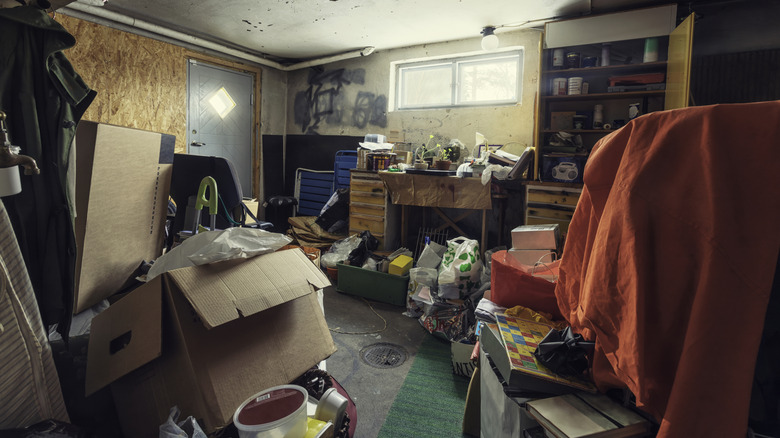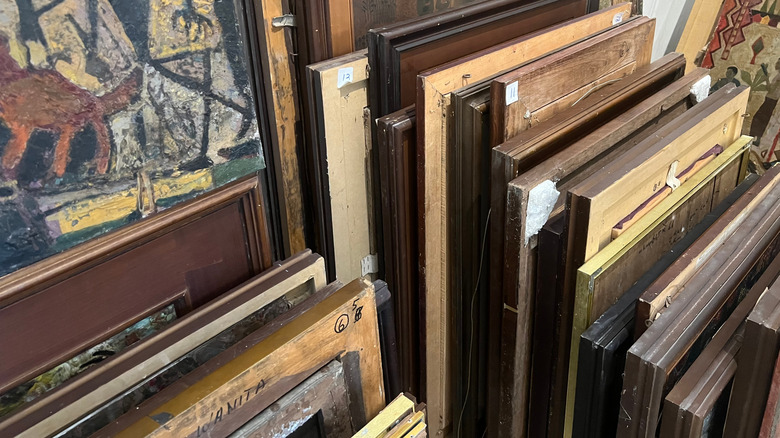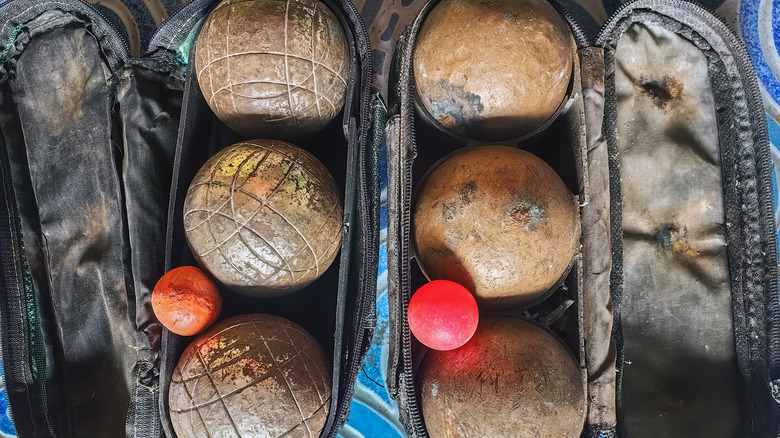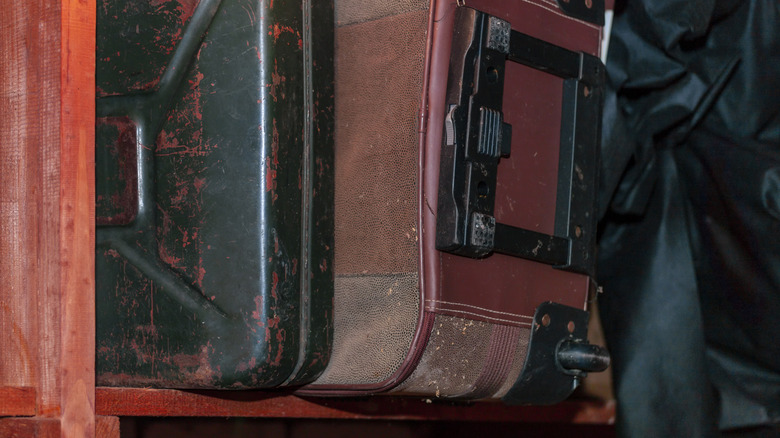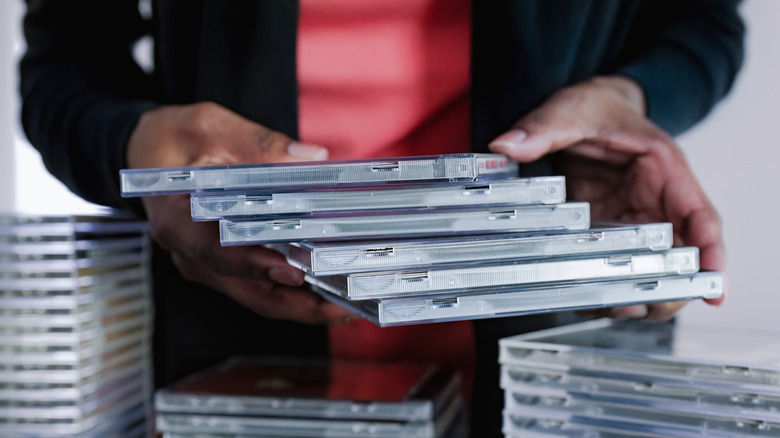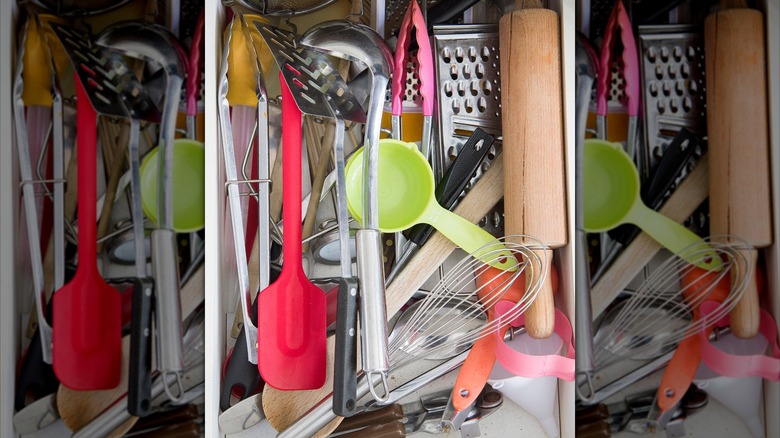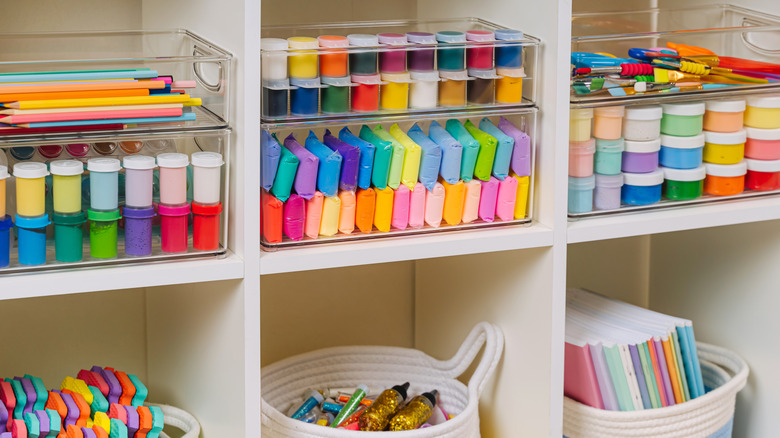10 Things That Retired Adults Need To Declutter (Or Just Get Rid Of)
If you've recently retired, you may be starting to think about downsizing your home, moving somewhere warmer, or relocating closer to family. This can be an exciting time of life, thinking about your newfound freedom and the potential adventures that await. However, there is one thing that can stand between you and realizing those goals: clutter. Even if you're not planning to move out of your existing home, clutter can prevent you from being able to fully relax and enjoy retirement. If all you think about every time you look around your house is how much excess stuff you have, are you really going to feel good about kicking your feet up?
Fortunately, House Digest spoke exclusively to organizing and decluttering professionals for their expert opinions. They provided great advice on some of the top things that retired adults should declutter and remove from their homes. This will help you implement some of the best strategies for decluttering your home and being mindful about which items you should focus on clearing out. Then, you'll find it much easier to focus your attention on enjoyable tasks, such as relaxing, traveling, or visiting family.
Ask adult children to take any of their belongings that they still want
If you have children, you may still be holding on to items that are theirs, even years after they move out. During an exclusive interview with House Digest, Mindy Godding, a certified organizer, the president of the National Association of Productivity and Organizing Professionals, and owner of Abundance Organizing, shared some advice on these items. She notes that things left behind by your adult children for long periods are likely not important to them anymore. Since they haven't asked for these belongings, it's likely they've completely forgotten about them. However, before tossing anything, she says, "Just in case, you can take photos of these belongings and send to the kids. Then give them a deadline for picking up those items and relocating to their house."
In a perfect world, your children will remove all of their belongings, leaving nothing for you to worry about. However, you'll still need to have a plan for any items that are left behind. To decide the best way to get rid of them, consider their current condition and potential usefulness to others. Old toys that are still in good condition can likely be donated. Some items, however, are probably better destined for the trash. For example, if you save an old car seat, you shouldn't try to donate it. Safety regulations have changed over the years, so it likely wouldn't be up to current standards.
However, there may be photos or pieces of artwork that mean a lot to you, even if your child doesn't want them anymore. Godding says, "If there are sentimental items from your kid's childhood that feel special to you, try to limit yourself to a small selection of keepsakes that could easily fit in a dresser drawer or a storage bin."
Declutter old supplies and materials from your former career
What did you do before you retired? Do you have any materials or supplies from your past job that you really have no use for any longer? "When we leave careers, we often forget to release all of the stuff that we needed for work," shares Godding. Perhaps you were a teacher and you still have a stack of books from your classroom in the basement. You could have been a salesperson and still have samples that are long since past their prime. Heck, you could even still have textbooks from your college courses before you even were hired for your full-time job. "You likely will find that you don't need to hold onto ANY items from this utilitarian category," says Godding.
Take some time to sift through the basement or attic to unearth all of these old "gems." Depending on what you uncover, you may decide that it is worth donating to charity. Very specialty items (that are still up-to-date) could be sent to your old workplace or a similar office nearby. If you have any old books from college, reach out to a local used bookstore to see if there is any interest in them before recycling them. Getting rid of memories isn't always easy. Godding shares some advice that may help you through the process. She says, "If you're feeling sentimental, choose your favorite one or two items that will evoke memories and put them on display. This is a technique known as 'shrining.' Once you've prioritized and featured your favorites, it becomes a lot easier to take photos and let the rest go."
Let go of any gifts that you don't love
You've likely been given a gift (or several) that isn't something you'd pick out for yourself. Even if you don't love these items, you may tuck them in a drawer or the closet out of guilt. After all, a close friend or family member likely put a lot of thought into choosing them, so getting rid of it can feel disrespectful. According to Godding, it's time to change this attitude if you're looking to really declutter your home. She says, "My operating protocol has always been that the recipient of any gift becomes the owner of that item, meaning: Once you have acknowledged and honored the spirit and meaning with which the gift was given, you are empowered to do whatever you want with the item itself."
There are a few things you can do with old gifts. One is to donate them to a charity. Just because something isn't your cup of tea doesn't mean that it won't bring joy to someone else. Godding offers an additional idea that you could consider if you have a little extra storage space. "Another great solution for unwanted gifts is to label the gift with the name of the giver and store them in a 'gifts-to-give' bin for future regifting," she explains. Being aware of who gave it to you will prevent you from accidentally giving it to someone in the same family or social circle as the original giver.
Don't keep framed art that you'll never hang
According to Godding, retired adults should declutter old pieces of artwork that they have no intention of using or hanging. "The longer we stay in a house, the more likely we will go through redecoration. While it can be easy to move out yesterday's chairs, lamps, and pillows, it seems many of us have a hard time letting go of framed art, especially if it is original work." There's no time like the present to make the difficult decision to let these pieces go.
This is also an opportunity to make the decluttering process more environmentally friendly as there are several options to keep the artwork out of a landfill. You could even make some money while you're at it. As Godding says, "Art is highly consignable; send photos and dimensions to your local consignment shop and ask if they could sell it for you." If the art isn't valuable enough to consign, consider donating it. You may also want to ask your children if they want any pieces that were hanging in the house during their childhood.
While decluttering old artwork is the ideal solution, Godding does offer some suggestions if you want to keep certain pieces but don't want them up on the walls. She says, "Find a protected spot that is guaranteed to be dry and stack frames upright on their sides, front-to-front/back-to-back." To protect special pieces, be sure to keep Godding's advice in mind. She says, "Art or photos framed with protective glass should always be stored in climate-controlled areas, as temperature fluctuations can trap moisture behind the glass, potentially damaging the art underneath."
It's time to get rid of outdated sporting or recreational gear
You can also declutter your garage by tossing some commonly stored items. And one type of item that may be unnecessarily taking up space in your garage (or basement) is old and outdated sports equipment. "Your knees don't ever want to see those skis again. With rapid advances in technology, sports equipment becomes outdated very fast," Godding says. She recommends letting go of old and outdated equipment you're holding onto with the dream that you'll use it again or as a reminder of your past active days.
"We've been sold this false narrative that it's our stuff that defines us, but what we know to be true is that our actions define us. As I like to say: 'Owning golf clubs does not make you a golfer. PLAYING golf— regularly— makes you a golfer.'" Again, the best way to declutter sporting equipment will vary based on its age and condition. If the items in question are in good shape (and still within regulation), consider donating them or selling them to a second-hand sporting equipment store. However, if they are broken or no longer safe to use, they likely belong in the trash.
Don't let old luggage take up precious space
Be honest. How many suitcases, duffel bags, backpacks, and other pieces of luggage do you have in your home? "For some reason, luggage seems like the category where we frequently buy a new favorite without purging the old one that has been replaced. I've seen yesterday's carry-on bag come down from the attic with dry-rotted wheels more times than I can count," shares Godding. While you still want to keep a few bags to make all those trips you have planned for retirement possible, how many suitcases are you realistically going to bring? Let go of any that you know you don't need.
As for the best way to get rid of those old luggage pieces, there are a few different options. You could turn that vintage suitcase or an antique trunk into a stunning side table. However, when you're trying to clear out your home, chances are you probably don't need additional furniture pieces. Instead, Godding offers an alternative that can have a huge impact on the lives of others. She says, "Once you've upgraded, pass that luggage on as a donation so that someone else can use it during its useful life cycle." Gooding points out that foster children and refugees are often in need of good luggage, so look for organizations that work with one of these groups.
Old DVDs, CDs, and VHS tapes have got to go
Is your DVD collection from 15 years ago taking up a lot of space, or do you still have your VHS tapes from the '80s and '90s? Godding says, "Now that everything is streaming, these outdated forms of media are simply taking up space. If you love it that much, you can always download it onto your computer or tablet for easy on-the-go entertainment." Even if you still have the tapes or discs, you may not have the equipment to play them if you want to.
Now is the time to let these old forms of media go. Godding recommends seeing if your local library will accept any of them. If not, bring them to a thrift store or charity donation collection center. If the tapes, DVDs, or CDs that you have are home movies or other special memories, then you might want to get them digitized. There are several companies that offer this service. You simply need to give them your old media, and they will convert it into a digital file. Then, save the files on a secure cloud, and you won't have to worry about those special memories slipping away.
Don't let paperwork take over your home
Managing and organizing all of your important documents can be a daunting task. If your home is inundated with paperwork, knowing where to start can be a challenge. When speaking exclusively with House Digest, Gerrit Jan Reinders, a decluttering expert and founder of BOXIE24, said, "Retirees should scan vital documents such as tax returns (retain only the previous seven years), insurance policies, and medical records." This way, the documents will be accessible, but they won't need to consume any physical space in your home.
Once you've scanned these items, you can get rid of the physical copies. Since these have your personal information on them it is safest to shred them, instead of simply recycling them or throwing them out. If you don't have a shredder, look for a community shredding event in your area. While you'll be able to get rid of a lot of old documents using these steps, there will be some things that you want to keep a physical copy of (such as a birth certificate or marriage license). And keep in mind, purging old documents doesn't stop new ones from piling up. Reinders says, "For storing other documents, have a basic filing system with clearly labeled folders within one cabinet, and think about a special inbox for sorting incoming mail right when it comes in."
Declutter any excess or unused kitchenware
The kitchen is another room that deserves some attention as you're looking for things to get rid of. You don't have to go overboard to declutter your kitchen, and doing so can be very manageable. As Reinders explains, "Retirees often have duplicate cooking utensils, one-time-a-year specialty gadgets, or large-party serving dishes they no longer use." He recommends being very selective about what you let yourself keep. "Store only what you use on a weekly basis, and restrict yourself to one set of basic dishes and possibly a second set of special occasion dishes," he recommends.
Unless the kitchenware that you no longer need is broken or damaged, it certainly doesn't belong in a trash can. Reinders suggests, "Donate good-quality kitchenware to community centers or relatives who are just starting." If your kids are sentimental, they may want first dibs on certain pieces. They may have fond memories of the jar where you stored your famous chocolate chip cookies or want to save their old baby dishes for their own children. Once you declutter your kitchen, the trick is keeping it that way. Many of us have a tendency to find little gadgets that we "need." To help prevent the clutter from returning, Reinders says, "For kitchen organization, enforce the 'one in, one out' rule for kitchen gear and utilize drawer dividers and cabinet organizers to optimize space."
Get rid of hobby materials that you know you'll never use
Reinders cites hobby materials that you know you'll never use as another key thing to declutter once you've retired. He says, "Retirement can mean the pursuit of new hobbies, but it's also the time to be practical about discarded pastimes. If you haven't picked up those knitting materials or that woodworking equipment in years, it's probably time to release them." Take an honest assessment of your garage, craft area, and other rooms in the home to determine which hobbies you'll pick back up, and get rid of any items that you know you simply aren't going to use.
Reinders says, "For hobbies that you still like, set aside special storage areas with clear bins, and hold only materials for projects you will realistically finish." As for the other materials that you will not use, many of these can likely be donated. If you have any specialty supplies, Reinders recommends donating them to clubs, schools, or community centers where others will be able to put them to good use.

